More than two years have passed since the first outbreak of COVID-19, and there is no end in sight. In South Korea, although 61.6 percent of citizens received full vaccination (including booster shots), the number of confirmed cases is still rising – exceeding 250,000 cases a day, since March 3rd. In this situation, new variations of the virus are being reported, such as Delta or the infamous Omicron.
This unprecedented pandemic has changed the lives of all people. After the outbreak, the whole world was in the midst of a recession. A lot of restaurants, cafes, and other self-owned businesses shut down during the pandemic. For that matter, compared to the pre-pandemic era, the number of self-owned businesses closing has increased by half. One of the industries that are affected most severely by the pandemic is the travel/tourism industry. According to the Ministry of Culture, Sports and Tourism, the amount of damage to the tourism industry reached over 16.6 trillion KRW, with sales falling about 62 percent compared to pre-pandemic sales.
While various industries are facing recession, some industries grew with COVID-19. Due to social distancing, a new acronym, “HOLO,” has appeared; each letter stands for the industries that had increasing sales performance during the pandemic. The letter H means “Health Care.” The sales record of the healthcare industry has increased about 148 percent after the outbreak. The letter O stands for “oversize,” because many people purchase a huge volume of groceries at once. The letter L is for “Life at home.” There have been increasing sales of products that can be used in houses, such as dumbbells for home workouts, household electronics for telecommuting, and toys for children who cannot go out and play. The letter O at the end stands for “Online Shopping.” It is dangerous to go shopping outside; thus, people have chosen to shop at home with their own digital devices.
However, the consumption pattern of generation MZ (Gen MZ) showed a little difference. Although people are shopping more online than offline, the sales of department stores increased because of the luxury goods. One of the department stores in Korea, the Hyundai Department Store, experienced the highest Gen MZ sales ever in 2021. The number of customers in their 20s who visited the Hyundai Department Store also increased by 86 percent. Moreover, Gen MZ customers contributed to nearly half of the total sales of luxury goods. This kind of consumption pattern is pointed out as “revenge spending” of Gen MZ who lost the chance to travel, go out, and have fun outside of their homes.
The term “revenge spending” refers to a phenomenon where consumption, which has been suppressed by external factors such as diseases and disasters, explodes at once. One example of revenge spending can be found in the 1920s. From 1918 to 1920, the Spanish flu had killed about 50 million global citizens and was called “the biggest disaster of mankind.” After this pandemic, the government of Spain encountered an unstoppable rise in prices and had a hard time stabilizing inflation.
Based on the above mentioned example, the explosion of purchasing happens after the incident that caused the suppression. However, at present, revenge spending seems to have started before the pandemic has ended. As mentioned, citizens of Korea have to live in a situation in which daily confirmed cases are still rising. The irony is that the sales of high-end goods are also rising.
To explore this phenomenon in-depth, The UOS Times conducted a survey asking the students of the University of Seoul (UOS) about their spending habits and their opinions on Gen MZ’s revenge spending. (The survey was conducted for five days, from February 28th to March 4th, and 36 students of UOS responded.)
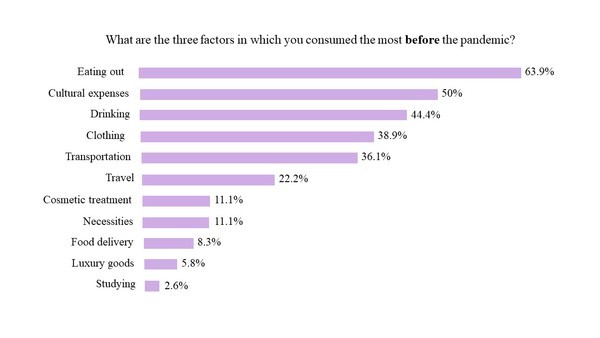
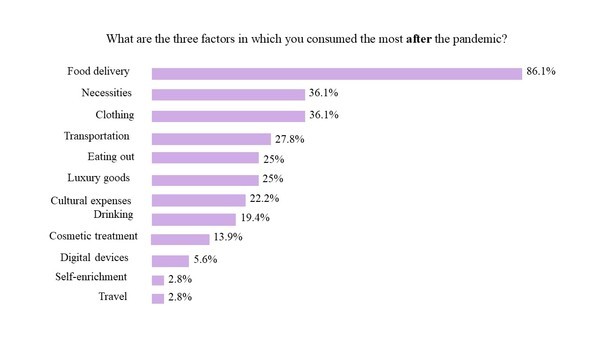
As can be seen above, the most noticeable change is students’ meal habits before and after the pandemic. Most of the respondents picked “eating out” as one of the factors they spent the most money on before the outbreak of the COVID-19 pandemic, followed by “Cultural expenses” and “Drinking”; thus, it can be assumed that students of UOS spent a lot of money on social gatherings. However, after the outbreak, the factor “food delivery” has overwhelmingly ranked at the top of the chart. This might have occurred due to social distancing and the prevailing delivery application. Of course, the factor “travel” has decreased heavily in the post-pandemic society. In the case of the factor “luxury goods,” the number increased from 5.8 percent to 25 percent. This change can be seen as an aspect of revenge spending. However, opinions of UOS students on revenge spending diverged.
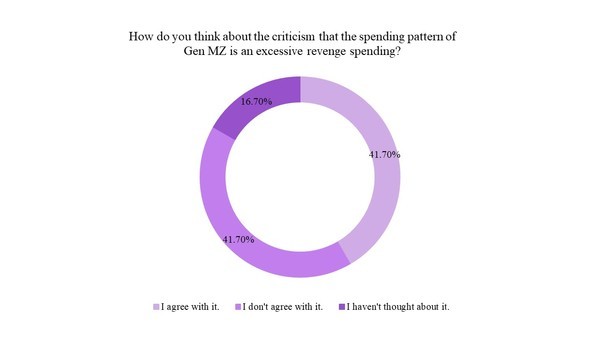
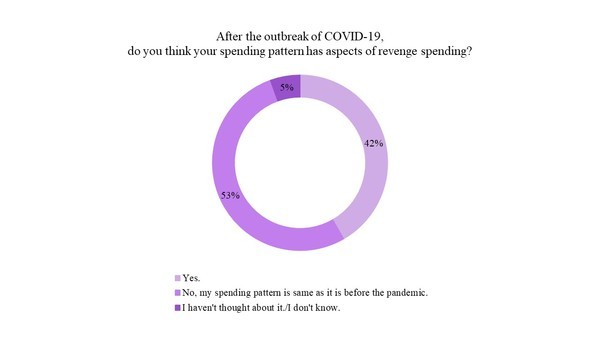
In the survey, the numbers of students who chose “agree” and “disagree” to the question asking their opinion about the criticism of Gen MZ’s spending pattern are the same. Moreover, 53 percent of the respondents’ spending patterns remained the same, compared to pre-pandemic society. Although it is hard to self-criticize one’s spending habits, still, more than half of the students denied the aspect of revenge spending. Students of UOS cannot represent the whole generation, and it is one of the possible reasons why this result does not match with the sales record mentioned above. To find out the more precise reason for the rising sales in luxury goods, The UOS Times conducted additional inquiries for those who disagreed with the criticism on revenge spending.
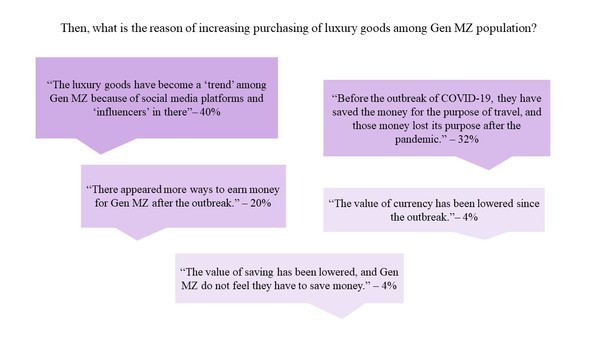
Out of all the respondents, 41.7 percent had varied opinions, including skeptical ones such as a lowered value of currency and savings. Most respondents said that luxury goods are a so-called “trend” among Gen MZ, so they spend money to get along with the social atmosphere. There are a lot of “influencers” who show their wealthy life on social media, such as YouTube, Instagram, and Tiktok. For example, the kinds of videos titled “Luxury goods haul,” “What’s in my closet?” can be found frequently on social media platforms. The Gen MZ population is motivated by those people’s lives and apparently wants to follow such lifestyles, creating a trend of consuming luxury goods.
There are other perspectives on these new spending patterns; for example, after the outbreak of the COVID-19 pandemic, the travel money saved by the Gen MZ population suddenly had no immediate purpose. Consequently, that money became their spare money to spend on things that are necessarily not needed but wanted. Some of the students applied for more ways to earn money after the pandemic, so Gen MZ had more spare money than they were used to in pre-pandemic society. With the amount of money that the Gen MZ population has saved, and can earn more, they can truly “imitate” the life of influencers by buying products of high-end brands.
With this prolonged pandemic, the spending habit mentioned above might have become solidified as well. Although social incidents, such as a pandemic, influence one’s spending pattern, it is dangerous to be affected too much. As a global society has plenty of possibilities to change, it would be hard to maintain our daily routines if we neglect to monitor our spending patterns. Monitoring one’s expenditure thoroughly can be easily overlooked, especially by students who have a lot on their plates, such as studying, preparing for getting a job, and so on.
For those who are not sure of how to keep their spending habits steady, The UOS Times recommends some ways to manage one’s money. With no doubt, the best way is to save regularly. There is a saying, “Save 10 percent of your income,” and it is a phrase that we have to keep in mind. Although there have been complaints that the interest rate of savings accounts is too low, it is still worth having spare money. If we steadily build a solid foundation, we could handle any crisis that comes into our lives. Periodically depositing a certain amount of money is the best way, but it is fine to save spare money each month. Moreover, there are installment savings that have high-interest rates for those in their 20s and 30s. Another way to manage expenditure is to set a budget for every expense. It is a more thorough way than installment saving because one has to estimate the total expense of each month and consider variations in spending. Through these ways of managing money, The UOS Times hopes our readers will have healthy spending habits and prepare for the change after the COVID-19 pandemic ends.

